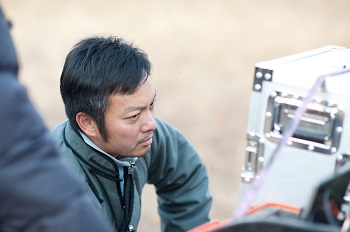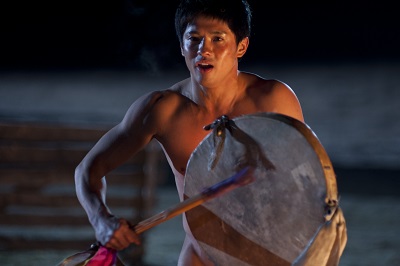By Gary M. Kramer.
The mono-monikered Hong Kong writer-director-producer, Scud (born Danny Chan Wan-Cheung) has been making distinctive films for the past decade. His debut, City Without Baseball (2008), co-directed with Lawrence Lau, was based on stories of the Hong Kong baseball team, who also starred in the film. The entertaining film generated headlines for its extensive full male nudity, first on display during the opening credit shower sequence.
Scud’s sophomore effort was Permanent Residence (2009), his poignant, semi-autobiographical drama about Ivan (Sean Li), a gay man in love with his straight best friend, Windson (Osman Hung). Throughout the film there are several moving scenes of Ivan lying next to or embracing Windson, the love of his life, and basking in their bromance. That they will never be friends with benefits is a situation that causes Ivan tremendous heartbreak. Permanent Residence also features Scud’s emphasis on examining death, depression, suicide, and the afterlife, themes that were expanded upon in his later films, most notably Voyage (2013).
As Scud found his footing as a director – his background was in IT – he garnered international acclaim for his subsequent films, Amphetamine (2010) and Love Actually…Sucks (2011). These dramas depicted the pain of love as well as characters struggling with trauma, addiction, and depression. While playing the festival circuit, they helped establish Scud as a unique filmmaker of palpable emotions. He captured the speed and intensity of an unexpected if doomed affair in Amphetamine; the longing of a love not meant be in Permanent Residence; and a jaundiced view of romance in Love Actually… Sucks as six interwoven stories chronicled bad love affairs.
Scud’s films are stylish, glossy productions that showcase attractive actors expressing their passions and naked bodies in showers and bedrooms, on beaches and outdoors. His films are sexy, but they are not necessarily erotic. Despite the frequent full nudity, his emphasis is more of an expression of the character’s freedom. The characters often portray their emotions on their sleeves, since Scud focuses on unrequited love throughout all his work. His characters are obsessed with someone they cannot have, or a love that is forbidden in some way. What resonates is the yearning the characters and the audience feel.
His romantic dramas are engaging because his actors communicate their desires, longing, and heartbreak through their intimacy and intensity. Byron Pang, as the troubled lover in Amphetamine, and Haze Leung, as a despondent policeman in Love Actually…Sucks, are especially noteworthy discoveries.
Both actors appeared in Scud’s 2013 film Voyage, an anthology of short films, all thematically linked by depression. The stories range in length and content as a psychiatrist (Ryo van Kooten) reflects on his patients, including Yuan (Byron Pang) who goes off to inner Mongolia as part of the Chinese re-education program; Ming (Haze Leung), a mentally disabled young man; and Sebastian (Sebastian Castro), an artist romantically involved with a young woman in the Netherlands.
While Voyage contained many elements from the director’s earlier work – the uninhibited nudity and distressing romantic entanglements – the film specifically addresses suicide and the afterlife from multiple perspectives. Voyage received an Artistic Achievement Award at the Chicago International Film Festival, where Scud was honored back in 2013. The film is only now getting a U.S. release on DVD, along with all of his earlier films.
Scud has since released two more films, Utopians (2015), and Thirty Years of Adonis (2017). He chatted with Film International about Voyage, his experiences with depression, his admiration for his actors, and his penchant for full nudity.
Voyage is a change of pace for you in that while it has some queer content, it is not an overtly queer or homoerotic film, unlike much your earlier work. Was there a reason you shifted your focus away from sexuality?
Everybody thinks I have a purpose, but it’s just a story I want to tell. City Without Baseball was an accident. I was still living in Australia, and I thought about becoming a filmmaker. One of my colleagues in my IT career was in charge of the promotion of the Hong Kong baseball team, and he wanted me to do a documentary. I thought it was better to make it a drama. So I did. Permanent Residence was more of my own story, and I wanted to make that film because it was in my heart and mind for years. That helped me reduce my depression.
So every film I make happens because the story is compelling to tell. People think I’m doing this to promote sexual equality, but that’s not my purpose. I have no political reasons. I just wanted to tell a story. I made Voyage because of my own depression. Samaritans is a British organization for suicide prevention in Hong Kong, and people there thanked me for making the film. They showed it to their clients. The film helped prevent suicide.
Can you talk about your interest in depicting romantic trauma, suicide, and mental illness?

ScudWhile I was making Amphetamine, I fell back into a wave of depression. It was a dark and sad movie, and I was sad making it. The character being raped by a few guys in a tunnel was a difficult scene to shoot, and my depression returned. After that I made Love Actually….Sucks!, and that was the end of my fantasy with love. That’s why I made the film, because for a long time I depended on passionate love to survive. I’m a very depressed person, and I tried to have some love to keep me going.
I am constantly standing on the edge of the cliff, and I could fall any time. But I want to live, so I tried to build some walls around me. I used to think that wall should be love and I tried that – but that’s the most unreliable wall on earth. If I leaned on that wall, I would fall. Now making films is my wall. That’s what keeps me going. As long as I have a project going on and have a story to tell, I will move on.
I had a bad experience making Amphetamine, despite the result. I like all of my films. Love Actually… Sucks! is one I like in particular. So I decided before I die, I should make a film about depression since I’m so well versed with it. I know my problems, and my friend’s problems, so I packaged them into a filmable format and made Voyage. All the stories were true stories.
What can you say about structuring Voyage as an anthology?
I make every film with the feeling it might be my last film. That’s always a possibility. Since it might be my last, I wanted to put as much as possible in it. For Voyage, everybody said I should tell one story and it would have a greater impact. Why dilute the impact with multiple stories? When I was writing Voyage, I just selected the stories I wanted to tell. I wanted to give different perspectives to depression. Voyage was the most difficult film for me to make. It took 3 years to shoot and because it was about depression, it brought me back to depression.
In Voyage, there is the story of the German lady, Leni. I met her when Amphetamine was screening in Berlin. She told me her story about the suicide of her mother, and if you recall that part of the film, after her mother died, her family was in a sad mood for years. She told me her story, and got her family to be in the film, too. Her father was her father, her sister was her sister, but we had a British actress playing her mother – since her mother wasn’t alive anymore. I wanted to present different places and time.
Voyage is your first film shot mostly in English and largely without dialogue. Can you discuss this decision?
It’s my first film in English because of the stories. Only the one with Ming is set in Hong Kong. The others are elsewhere in Asia and Europe. In all of my films, I let the actors speak their language at that time. Voyage was criticized for the English accents of my actors, but I made them speak as if they are in real life. The woman who plays the Filipino maid for Haze’s character can speak perfect English – better than I do. But I made her speak like a Filipino maid in Hong Kong. When audiences don’t hear what they are accustomed to, they think it’s a bad production. But I made them use their language as much as possible. I used English because they spoke in English. But they do speak English because they don’t know Cantonese. I’m trying to be realistic.
You work again with Haze Leung and Byron Pang, who you cast in key roles in earlier films. You also feature out actor-singer Sebastian Castro in Voyage. Can you talk about how you created roles for each actor?

Amphetamine
I think one thing that kept me going is that I have luck with actors. I come across these guys and girls who are devoted to my work. I’m in debt to them. When I make a film, I just tell the story, with no purpose, as I said. But I do want the film to be successful to do my actors justice. For me, I don’t fucking care. I have no regrets, but the people who work for me and give their all, they don’t get the return they deserve – the recognition and fame. It makes me not sleep well.
Haze happened to be my assistant director. He graduated from film school and is very educated. He was in charge of casting Love Actually…Sucks! There were many cast members in that film because it has six stories. When he showed me the choices, there was one role I didn’t say anything about. He realized I was not satisfied with who he found for me. He asked me out for a drink. He said he knew I wasn’t satisfied with the casting for the Policeman, and he asked if he could do it. I had to change the script. He was an evil policeman, so the tone changed because of his participation. I gave him the role of Ming in Voyage.
Byron is the best actor I can find in Hong Kong. He’s so natural. I have to say I feel in love with him while shooting him. I was touched when my cameraman on Amphetamine, who is a straight, said, “I will make love to Byron with my camera.” I think he did. After Amphetamine, I invited Byron to work on Love Actually…Sucks!, but he had to pass on that, so I made him do Voyage, which I think his best performance. It is deeper and better than Amphetamine.
I met Seb when Amphetamine screened in Chicago. He came forward to sit in the first row and asked me a question at the Q&A after the screening. I was impressed, and when we left, I handed him my card. He told me he was an aspiring actor but had a problem with nudity. Whenever someone tells me he has a problem with nudity, it becomes my objective to strip him bare. After that, he moved to the Philippines, and he made successful [music] videos. He asked me to make his first video, but I declined.
Of course, we have to talk about the nudity in the film. Why do you focus so much on skin?
It has to go back to City Without Baseball. Before that, there was no male nudity in Asian cinema. There wasn’t that much nudity in City Without Baseball but it caused so much controversy. A gay forum online had a powerful article that was critical of my employment of nudity in the film. But I watched European directors – Pier Paolo Pasolini, Peter Greenaway, and Pedro Almodóvar – and there was so much nudity in their films. Asians have problems with male nudity especially. It made me angry and defiant. So, in Permanent Residence, the two leading men were unclothed throughout the film. That film was praised and people don’t talk about my nudity anymore. After that, you see more gay films and sex scenes; it’s almost mainstream now.
A famous actress in Japan came to me and did an interview after seeing Voyage in Japan. When she saw the nude scene of people walking into the sea, she was shocked at first. But then she realized how powerful it was; if they were clothed, that scene would not have so much impact on her. The first shots of Amphetamine featured Kafka (Byron Pang) standing on the edge of a roof about to jump. He is wearing only angels wing. Normally, he would have his briefs on, but I convinced the actor to drop them. When he watched it, Byron told me he knows why I insisted on him being naked. It makes such a difference.
I reckon my insistence on full nudity is because I’m a purist. Butts, tits, and penises are integral parts of a body. What’s an alien piece of cloth got to do with it? I honestly only find completely naked men sexy.
What can you say about the elements of ghosts and the afterlife in Voyage?
Voyage is a very special film, even from the others I’ve made. It took on a life of its own while I was making it. It evolved, and “talked” to me during shooting. I usually don’t improvise much. But this film took three years to make, and I found myself shooting more scenes about the afterlife. From what began as a study on depression, it became a film about the afterlife too. For every story I shoot, I have wondered what happens to the guys after they die. I have to really think about what would happen after death – to them, and to me. Will I see family and friends again? I had a very unique visualization of someone after his death. This is becoming more a theme of my films, especially in Thirty Years of Adonis, which is about the afterlife.
You end Voyage with the statement, “Film is like life.” Can you discuss that observation?
I didn’t study film. I had an IT career, and my social circle was with artists. My friends weren’t surprised, but the rest of the world was stunned that an IT guy became a filmmaker. Film has taken over my life and it’s given me a cause for everything I do. I can now tell my friends that they no longer have to worry about my depression as I still have films I want to make. So I will try to stay alive for as long as possible. It’s my lifetime passion, and it saved my life, and became my life. I’m so happy with my imagination that I am not afraid of death anymore because I know how I’m going to die: on a film set. Probably sitting on a chair examining a shot and having a heart attack. If I had to take my life myself I would try to decide on such a way that the death will help my film.
Voyage will screen at 7:30pm, Friday, March 23 at Plays & Players as the Centerpiece Screening of Philadelphia’s QFLIX.
Gary M. Kramer writes about film for Salon, Cineaste, Gay City News, Philadelphia Gay News, The San Francisco Bay Times, and Film International. He is the author of Independent Queer Cinema: Reviews and Interviews, and the co-editor of Directory of World Cinema: Argentina, Volumes 1 & 2.
( Originated from http://filmint.nu/?p=23662 )
